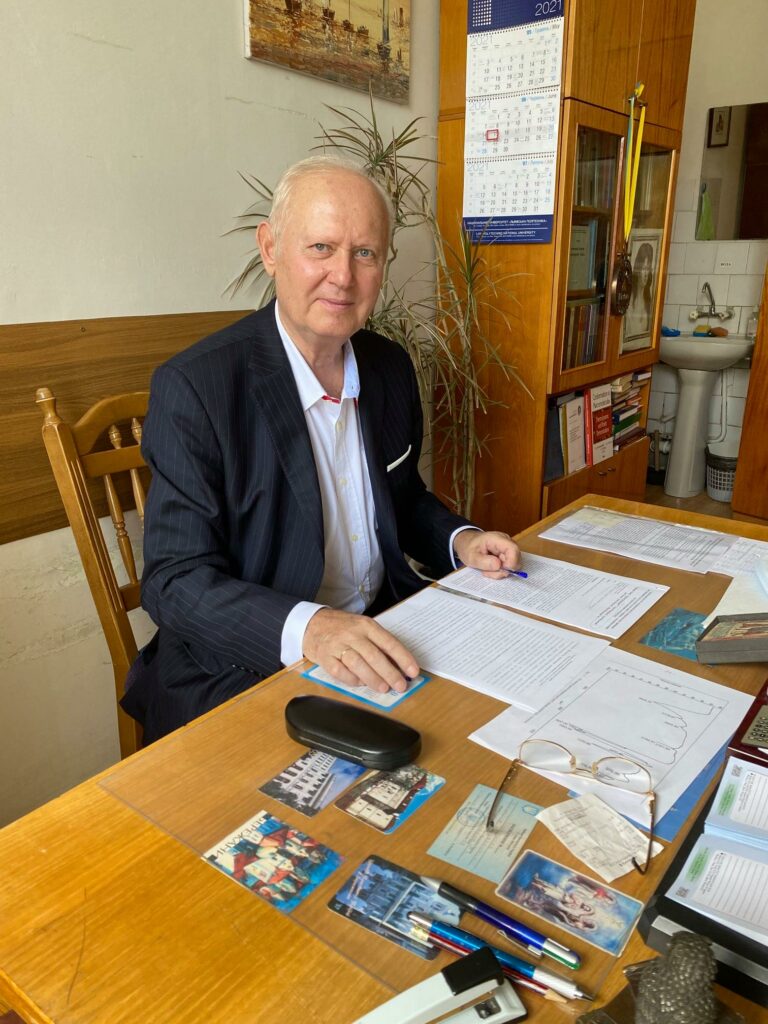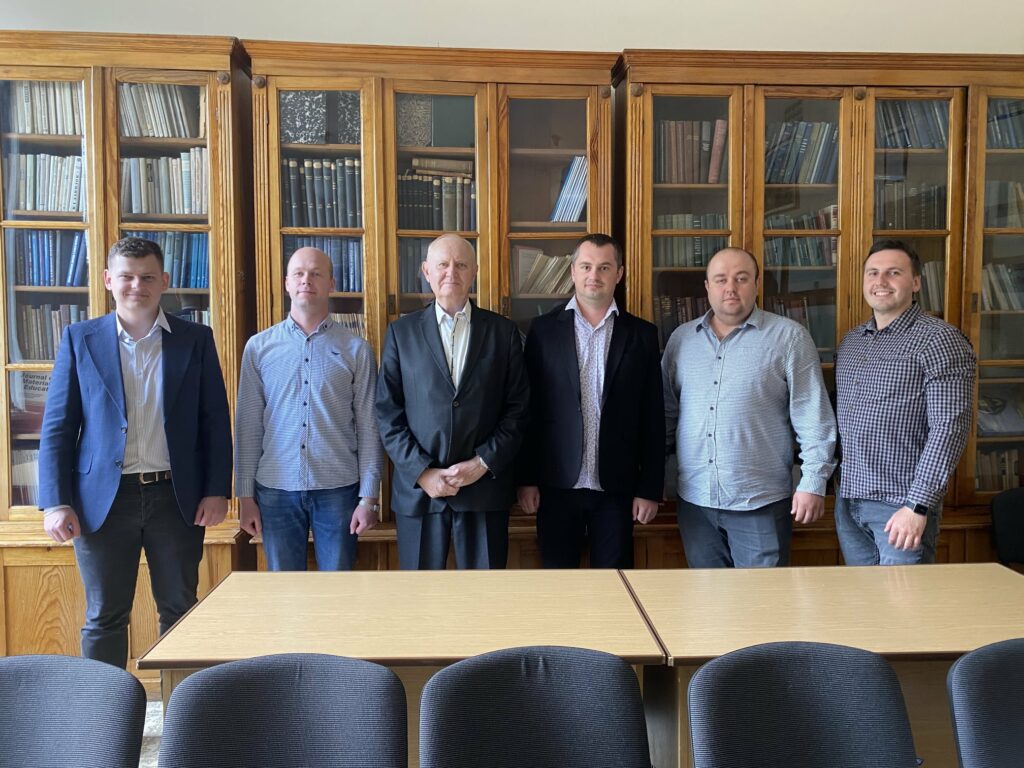Mykhailo Bratychak, a professor at the Department of Chemical Technology of Oil and Gas Refining at Lviv Polytechnic National University, is well known in both Ukrainian and world scientific communities. M. Bratychak is the author and co-author of more than 800 scientific works, six textbooks, eleven monographs and ten four-language dictionaries on chemistry, oil refining, coal and polymers. He is also the author of fifty patents for inventions and utility models. We planned to ask Mr. Bratychak about the ambitious project that he and his team are implementing with NRFU (National Research Foundation of Ukraine) grant funding (within the framework of this project the “breakthrough” scientific discovery was made), but, as is always the case with masters, the conversation was not only about science.

You can write an adventure novel about Mykhailo Bratychak’s life, which will include everything: fateful coincidences, the ability to make difficult choices, career obstacles, and, in the end, well-deserved success.
… Many years ago, a gifted graduate of the Faculty of Technology of Organic Substances of Lviv Polytechnic got into science by accident. In fact, he was sent to work in Boryslav (they even promised him an apartment!), but at the last minute the dean offered him to work as a senior laboratory assistant at the Department of Organic Chemistry, with the prospect of completing the postgraduate program.
– I was a regular guy from Ternopil region, I had no idea what a PhD degree was and why it was needed, – Mr. Bratychak recalls. – I just worked hard and hard, and I had good progress.
POSTGRADUATE STUDIES – NOT FOR A CONSCIOUS UKRAINIAN
Not immediately, but the young scientist was offered to enter postgraduate school. The “troika”, which included the Secretary of the Party Bureau of the Faculty, gathered for a meeting to approve his candidacy. They listened, shook their heads and refused. During the meeting they asked: does he really sing songs in Ukrainian in his free time? (Such an anonymous complaint was received by the party cell of the institution). Colleagues then explained: Those who sing “Ukrainian songs” have no place in the postgraduate school of Lviv Polytechnic.
The young scientist continued to work, participated in conferences of the best scientific institutions of the USSR, engaged in scientific research. At the same time, he prepared his PhD thesis, which he defended with great obstacles in Dnipropetrovsk. After the defense he worked at the Department of Organic Chemistry of Lviv Polytechnic Institute.
Later, a promising specialist was offered to head a problem laboratory at Lviv Polytechnic, provided that he starts writing a doctoral thesis. He wrote it in eight years. But all at once, the University liquidates the laboratory he heads. “I found myself with nothing, however, I had the doctoral thesis written in the laboratory,” – Mr. Bratychak recalls with a smile.
“MISHA! WHAT DID YOU DO? !!”
However, Mr. Bratychak was not afraid of work and new topics, so he returned to the department, which he graduated from. A year later, having more than a hundred scientific publications, he defended his doctoral thesis at his native Lviv Polytechnic and received the grade of Doctor of Chemistry in two specialties “Organic Chemistry” and “Chemistry of Macromolecular Compounds”. “But at this moment the secretary of the party organization comes running and shouts: “Misha, what have you done?! How could you defend your doctoral thesis if you are not a member of the CPSU ?!” – Mykhailo Bratychak laughs.
It was a real scandal: not only did a Ukrainian, but not even a member of the party defend his doctoral thesis. The head of the party bureau gave him an application form and ordered him to fill it in. A year later he asked whether Mykhailo filled in the form. The scientist replied that it was in process. And then the USSR collapsed and the problem disappeared.
– In 1994, the position of the head of the Department of Chemical Technology of Oil and Gas Refining became vacant, and I was offered to head it”, – Mr. Bratychak continues. – “I refused for a long time, because as many as five prominent professors worked at the department, and at that time I was a “boy” compared to them – 48 years old. But my candidacy was put to the vote. And they chose me!
The new head of the department immediately began to put things right. The premise was very poor: the walls peeled of pain, it was dirty. Mykhailo Bratychak bought paint at his own expense and brought it to the premise. Then he put on a white suit and gathered the staff. He explained that if he came in a month and soiled the suit, he would offer to write applications for dismissal.
In addition to the external order, he initiated changes in the scientific activity of the department. He started holding scientific conferences, taught how to prepare them and write abstracts.
The scientist was also noticed abroad. Over the years, he has received dozens of invitations to work in Germany, Poland, USA, Mexico. He accepted offers of cooperation, but refused to move to permanent residence. “Although there were times when they lived here for ten dollars, and I brought much more from abroad. Krakow Polytechnic even offered me the position of head of the department and good conditions to move, teach and train post-graduate students. But I thought: don’t we need to train them in Ukraine?.. By the way, my students defended twenty PhD and two doctoral theses”, – Mr. Bratychak adds.
WITHOUT ROADS, WE SHALL NOT APPROACH EUROPE, NOT EUROPEANS WILL APPROACH US
The ability to find promising topics and create “combat” scientific teams came in handy when the National Research Foundation of Ukraine announced its competitions. The head of the department gathered the team and suggested to think about an idea (and there were many of them) the young colleagues should like to implement, to begin with. After long hot discussion, it was decided that it was time to solve the problem of road quality. After all, good roads are the most important condition for economic development.
If there are roads, then goods arrive at the destination on time, the country becomes attractive for tourists. The team was formed, which included a supervisor and young scientists; they wrote the application for the project “Obtaining modified low-molecular organic bitumen from petroleum residues” and submitted it to the NRFU competition “Support for research of leading and young scientists.” We soon learned that our application was approved and the team was receiving funding (four million eight hundred thousand hryvnias).
UNBEATEN TRACK
What do scientists plan to do to improve the quality of roads? (And is it really possible to solve this problem at all?). The professor is convinced that, in reality, science and industry must work together. The task of scientists is to create quality material for roads, and the task of practitioners is to implement the development.
The road will be smooth and durable, if it is correctly built. Low-quality bitumen softens in the summer heat (wheel tracks are formed on the road because of transport passing); in winter road pavement tightens and cracks. Therefore, the scientists decided to create such a top layer, which would be both solid, elastic and had the adhesive properties (adhesion). – “We could follow a tried and tested way and try to make modified bitumen from distilled or oxidized bitumens and commercial polymers (which are practically not produced in Ukraine)”, – explains the researcher. – “Most scientists in the world work in this way. But young colleagues suggested creating a new high-quality cementitious material. I respected their opinion, and we decided to carry out chemical modification of bitumen with low molecular weight organic compounds.”
The chemist will immediately understand what we are talking about, but for non-specialists it is worth explaining: the idea of modernizing existing bitumens with low molecular weight organic compounds is innovative not only in Ukraine but in the world.
Experiments have confirmed that the components do react with bitumen and tar compounds and form the desired product. After a series of studies, scientists have applied for a patent for the invention and will soon receive the patent.
DURABLE AND CHEAP
Of course, the scientists did not start from scratch. They researched this topic for many years, and winning the competition meant the opportunity to purchase the necessary equipment. And it was bought: it is the device for determining the dynamic viscosity of bitumen and modeling the aging process of bitumen by RTFOT.
Without this equipment, work on the project was impossible, and it would have to conduct some research abroad, in universities of the United States, Poland, Germany. By the way, the scientists use available and inexpensive components produced in Ukraine in order to modify bitumen. This means that the new roads will be not only durable but also inexpensive.
PRACTICAL TESTING
The scientists have already studied the optimal conditions for the modification of bitumen, determined how many and what components must be introduced, at what temperatures, and what catalysts are needed. They also optimized the process of creating new bitumen (this is necessary for future production). The experimental data were submitted to an independent applied-research laboratory, which confirmed their reliability. In other words, disinterested experts tried to reproduce the process of modification of bitumen, and they succeeded. The next stage of work consists in testing the results of laboratory tests in practice. For this purpose, subcontractors were involved in the work, who produced prototypes of asphalt and tested them. “Laboratory WestDorService” Private Enterprise should produce a “pilot” coating next year and test it in accordance with state standards. Then it will be possible to pass to industrial-scale production.
Currently, scientists continue their work, in particular, prepare papers about their invention for publication, two of which are already published. One of them is published in the Chemistry & Chemical Technology journal, which is indexed in the international scientometric databases Scopus and Web of Science.
YOUNG SCIENTISTS STAY AT HOME
Five young scientists are involved in the project, they are the researchers of the Department of Chemical Technology of Oil and Gas Refining, associate professors Volodymyr Hunka, Yuriy Prysyazhny and assistant Yuriy Demchuk; Associate Professor of the Department of Physical, Analytical and General Chemistry Yuriy Hrynchuk and Associate Professor of the Department of Roads and Bridges Yuriy Sidun. All of them were given the opportunity to perform significant research and receive a decent salary. One of the team members, Yuriy Demchuk, recently defended his PhD thesis (the first results of the study were also useful), and another, Volodymyr Hunka, plans to defend his doctoral thesis based on the outcomes of the project.

In August of this year Mikhail Bratychak entrusted the position of the Head of Department to his tutee. But he does not sit idle: he manages a research laboratory in the higher educational institution, continues to cooperate with international and Ukrainian partners and look for further grants.

“By the way, one of the young researchers of our team was recently offered a job abroad, but he refused. He said that he was working on an interesting topic at home and received no less”, – Mr. Bratychak dded. – “That is, promising staff remain to work at the Ukrainian University. It is very important! I see positive changes in Ukrainian science. If the team is active and does not wait “good weather by the sea” (i.e., does not rely only on basic funding), if it seeks and finds international and Ukrainian grants, and most importantly, works hard, then it is possible to implement ambitious ideas and earn decent money in Ukraine.”
Svitlana GALATA
Svit newspaper, № 41 – 42, November 2021
